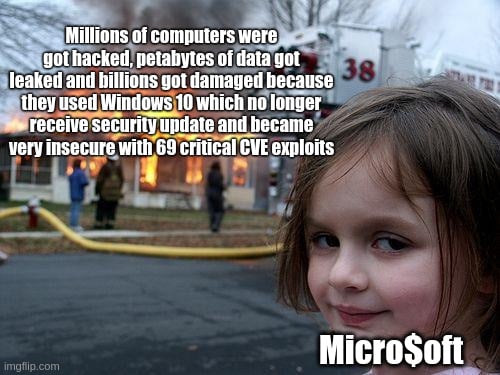this post was submitted on 26 Oct 2024
485 points (87.6% liked)
memes
10398 readers
1871 users here now
Community rules
1. Be civil
No trolling, bigotry or other insulting / annoying behaviour
2. No politics
This is non-politics community. For political memes please go to [email protected]
3. No recent reposts
Check for reposts when posting a meme, you can only repost after 1 month
4. No bots
No bots without the express approval of the mods or the admins
5. No Spam/Ads
No advertisements or spam. This is an instance rule and the only way to live.
Sister communities
- [email protected] : Star Trek memes, chat and shitposts
- [email protected] : Lemmy Shitposts, anything and everything goes.
- [email protected] : Linux themed memes
- [email protected] : for those who love comic stories.
founded 1 year ago
MODERATORS
you are viewing a single comment's thread
view the rest of the comments
view the rest of the comments

I didn't say they wouldn't know what it meant, I said they would be unlikely to know how it will affect them in their daily usage.
Most Windows users are accustomed to installing and updating their own applications, and letting the OS deal with its own updates and patches. They probably don't think much about all the dependencies and what version they're on because the installers deal with it.
When deciding whether to use a Linux LTS they may think it sounds like a good idea, with no appreciation for what happens when a package gets out of date, and their package manager won't update it, and they don't know why. They go down the rabbit hole of adding PPAs etc, which solves it in the short term maybe. Then it only gets worse from there, because they didn't understand that using an LTS means you have chosen to accept some packages being out of date for a while, until the next LTS is released.
Maybe they're the kind of person that is happy with that, or maybe they're not. But if you try to explain to the average Windows user about package repositories, Flatpaks, Snaps, LTS, rolling releases etc, you can pretty much guarantee they'll never try it because it sounds too damn hard.
Which brings me back to my original point... Us Linux users argue amongst ourselves too much about this stuff to attract Windows users, no matter what Microsoft does with their data.
"If you want super up to date stuff, an LTS is not your best choice, I'd go for something like Fedora and just keep back ups or set up snapper using this easy guide on youtube." (For example.)
”Package managers are basically your app store, you'll probably have the official one for your distro and then a general one called flatpak, use these for downloading your 'apps.'" They can understand a few basic things, they're windows users not Amish.